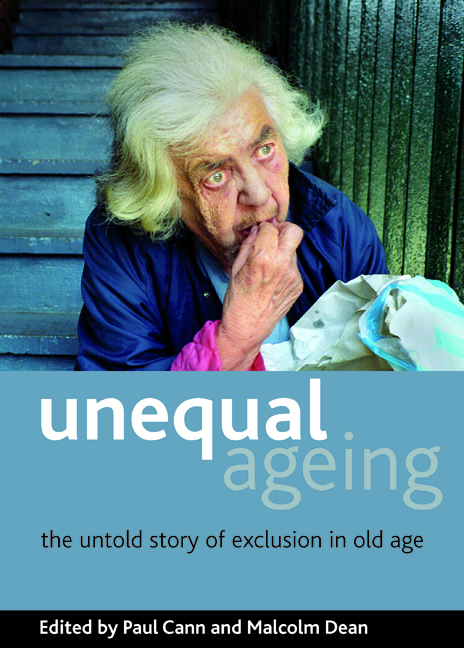Book contents
- Frontmatter
- Contents
- List of tables and figures
- Notes on contributors
- Acknowledgements
- one How social age trumped social class?
- two Too tight to mention: unequal income in older age
- three three The uneven dividend: health and well-being in later life
- four No place like home? Housing inequality in later life
- five What does it mean to be old?
- six A life worth living? Quality of life in older age
- seven Why is ageing so unequal?
- eight Rewriting the story
- Index
eight - Rewriting the story
Published online by Cambridge University Press: 16 July 2022
- Frontmatter
- Contents
- List of tables and figures
- Notes on contributors
- Acknowledgements
- one How social age trumped social class?
- two Too tight to mention: unequal income in older age
- three three The uneven dividend: health and well-being in later life
- four No place like home? Housing inequality in later life
- five What does it mean to be old?
- six A life worth living? Quality of life in older age
- seven Why is ageing so unequal?
- eight Rewriting the story
- Index
Summary
We have acknowledged big strides forward over the past decade. Some indicators of poverty have shown sustained reductions in the number of older people who live on less than a recognised level of low income. Pension Credit in particular has helped many older people carry on doing the things that are important to them.
Likewise, periodic transport concessions since 2000 have helped people enjoy their leisure more and stay in touch with family and friends. Although at 68 per cent the rate of take-up of the concessions is low, and although bus travel is only one part of getting out and about, the concessions have put sizeable sums of money behind policy words, which is welcome.
And the debate about age has certainly begun. There is an alertness to our changing demography and more sense of urgency, evidenced by the increasing volume of articles and publications about ageing. Not enough substance has yet been given to the Prime Minister’s declaration in 2006 that ageing was a Grand Challenge facing society. But we are perhaps on the way, as a spate of government strategies and initiatives testify.
In 2000 the automatic uprating of the basic state pension in line with the Retail Price Index (RPI) increased the basic state pension by a mere 75 pence a week. A sleepy Whitehall failed to spot the looming outrage. Raw anger about this paltry award triggered a knee-jerk reaction of substantial uplift to pensions and allowances thereafter. But it also activated a sense of indignant entitlement. It is hard to imagine such official torpor now.
But big inequalities remain. And this story is either untold or told in shocking, rapid glimpses which produce shocked and hasty responses, without changing the reality.
Some are part of the biological script of old age. The risks of stroke, cognitive decline, immune system deficiency, bladder and bowel weakening or bone thinning all accelerate in later life. And while research is making important inroads in these areas, ageing research needs far more investment to unearth causes of decline, and thence solutions.
Some we have manufactured and find them too expensive to remove.
- Type
- Chapter
- Information
- Unequal AgeingThe Untold Story of Exclusion in Old Age, pp. 159 - 172Publisher: Bristol University PressPrint publication year: 2009



